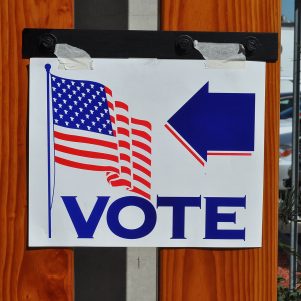Mass. delegation in scramble to advance opioid proposals
By State House News Service | May 12, 2016, 6:11 EDT
 (Courtesy of Flickr)
(Courtesy of Flickr) STATE HOUSE — Echoing a debate that dominated Beacon Hill for the better part of the past year, the U.S. House of Representatives on Wednesday is poised to vote on a package of proposals, several of which were sponsored by the Massachusetts Congressional delegation, that would push the country along a similar path charted by Bay State lawmakers to combat the opioid epidemic.
Congresswoman Katherine Clark sponsored three bills set to come up for votes in the House, including one authorizing the partial-filling of opioid prescriptions, an issue state lawmakers wrestled with to ensure they did not run afoul of federal law.
Congressman Joseph Kennedy also has a bill, which passed the House Wednesday, that would create a task force to clarify the guidelines around pain management and opioid prescribing practices.
Clark, a Melrose Democrat, took to the floor of the House on Tuesday night urging her colleagues to strike back against what she described as a “public health crisis.”
“If there has ever been a time to put away partisan differences and ideological rhetoric, it’s now,” Clark said, sharing the story of a single mother – Debra Deagle – who she met at a town hall meeting in Revere and who lost her only son to opioid addiction.
Stephen Deagle, a honor student at St. John’s Preparatory High School in Danvers, went on to Northeastern University where he was studying computer science. Clark said opioids Deagle was prescribed his freshman year of college for impacted wisdom teeth started him on his path to addiction. Deagle died in January 2015 at 32.
“My request to this Congress is to listen to Debbie and the pleas of too many other moms like her. This crisis is an urgent calling for Congress to act and save lives,” Clark said.
Clark has sponsored three bills that would allow patients or doctors to request partial fills of opioid prescriptions, increase the availability of the overdose-reversal drug naloxone and require states that receive federal funds for the treatment of opioid-dependent babies comply with federal law and enact certain guidelines for child welfare.
Earlier this year, Gov. Charlie Baker signed legislation making Massachusetts the first state in the nation to allow partial prescription fills.
To make sure the new law didn’t contradict federal policy, state lawmakers stipulated that the remainder of any partially-filled prescription would become void, requiring a patient to return to a doctor if they decided they needed additional medication.
Clark’s bill, however, would give patients up to 30 days to return to a pharmacist to request the balance of their prescription.
“We’re thrilled that what we did prompted federal review of partial fill regulations,” Sen. John Keenan, a Quincy Democrat who pushed the partial-fill provision at the state level, told the News Service Wednesday.
Keenan said the impact on state policy from Clark’s bill, should it become law, would depend on the exact wording, but he believes that the Massachusetts law could be interpreted as more restrictive, and therefore allowed.
“The idea is to just give more control to the patients to request a lesser quantity,” Keenan said.
Votes on Clark’s bills in the House are expected early Wednesday evening, according to Clark’s staff.
In a floor speech promoting his own piece of the opioid abuse prevention package in Congress, Kennedy said, “When it comes to a federal response, there is no silver bullet.”
His proposal, introduced with Republican Rep. Susan Brooks of Indiana, would task Health and Human Services, the Veterans Administration, the Food and Drug Administration, the Drug Enforcement Agency and the National Institutes of Health with working with prescribers to update guidelines for managing chronic pain and prescribing painkillers.
“We have both seen firsthand how a lack of access to treatment can lead those suffering from addiction into our court system. With this bill, we are trying to change the course of their path and stop addiction before it even begins,” Kennedy said, according to prepared remarks shared by his office.
Gov. Baker in Massachusetts has also worked with the heads of the state’s medical schools to incorporate more pain management instruction into the curriculum for future doctors.
U.S. Rep. Bill Keating, of Bourne, successfully attached an amendment to Kennedy’s bill that would require the task force to consider the practice of co-prescribing naloxone alongside opioids, while a separate amendment of his that he expects to be voted on Thursday would add drug take-back programs to the list of authorized uses for funds made available under the comprehensive bill.
Votes in the U.S. House on the opioid bills are expected to continue Wednesday and into Thursday.
— Written by Matt Murphy
Copyright State House News Service











